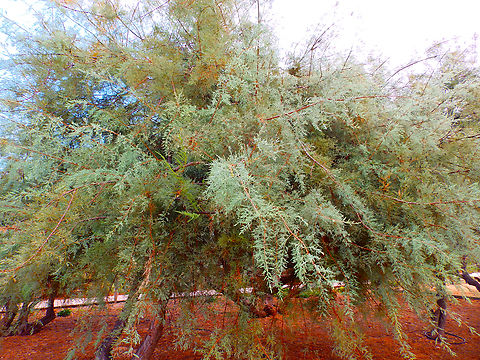
Appearance
Small, monoecious evergreen tree, up to 8 (10) m high, or more frequently erect, not very dense, irregular shrub. Trunk more or less upright, with grayish-brown bark that is very cracked in older specimens. Branches with slightly cracked bark, darker. Brownish or reddish-brown twigs, the younger ones greenish. Leaves alternate (2-5 mm), squamiform, from triangular-lanceolate to linear, with a sessile acute tip, semi-embracing, little applied, freer than in other species of the genus, without stipules. Leaf blade with clearly visible salt-secreting glands, especially in brackish habitats. Large, long-pedunculated, not very dense clusters, which generally arise on the twigs of previous years. Tetramerous flowers, with 4 petals, narrowly obovate to unguiculated, white or pink. 4 sepals, 4 stamens and 3 styles. Rarely pentamerous flowers may appear. Staminal disc parasyllophous, with the apex of the lobes of the nectariferous disc slightly wider than the base of the stamens. Fruit in an ovoid capsule 6-8mm long, dehiscent into 3 valves that when opened release numerous seeds with a long and dense tuft of white single-celled hairs. Blooms in winter and spring. Fruits in spring.Distribution
Eastern Spain and northern Africa, where it lives mainly in the drier Mediterranean regions and the northern Sahara.Habitat
Inhabits wet lands, especially in river beds and banks, sebkhas lagoons and other wetlands. Tolerates salinity well.References:
Some text fragments are auto parsed from Wikipedia.
https://es.wikipedia.org/wiki/Tamarix_boveana#Enlaces_externoshttps://commons.wikimedia.org/wiki/Tamarix_boveana